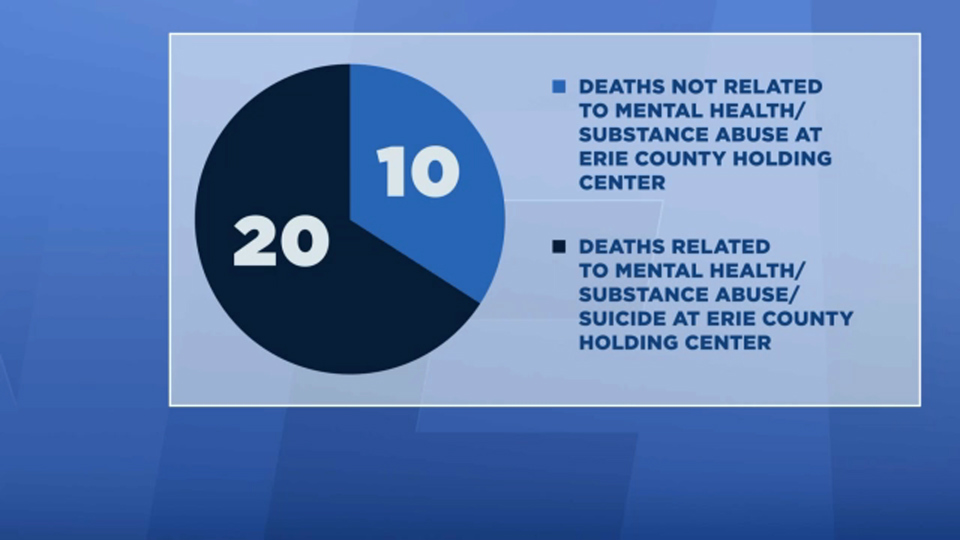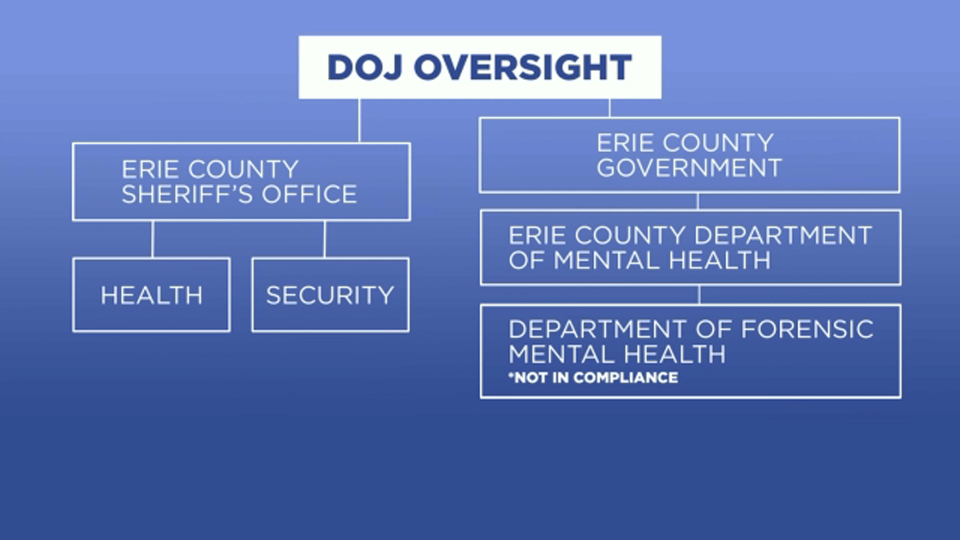In every county in the U.S. that has both a county jail and county psychiatric facility, more seriously mentally ill people are incarcerated than hospitalized, according to The Treatment Advocacy Center.
Erie County and its jail mirror that national trend, but what sets the Erie County Holding Center apart is its history of inmate deaths.
"Jails were designed to hold individuals in custody while their matters were being adjudicated,” said Thomas Diina, the superintendent of the Erie County Holding Center. “They were never designed to be treatment centers, hospitals, clinics, but unfortunately, because of changes in the community, not within the jails, we have become the de facto treatment centers."
The four deaths at the Erie County Holding Center this year sparked outrage in the community, bringing to 30 the number of deaths since Since Sheriff Tim Howard took office in 2005.
Of those 30 deaths, 20 of those individuals who died did so by suicide or had underlying mental health and substance abuse issues.

"That particular issue is a national issue. It is not localized to Erie County," said Thomas Diina, the superintendent of the Erie County Holding Center. "We put ourselves in the best possible position to minimize the risk of an incident occurring, but unfortunately, it is never going to be 100 percent."
A decade ago the Department of Justice filed a complaint against the jail in 2009 alleging that the jail violated the constitutional rights of those incarcerated there.
In 2010, the jail agreed to let the DOJ have oversight of its health and security department. The Erie County Department of Forensic Mental Health, which falls under the county and not the sheriff's office, also agreed to this.

"It has been a great help to us,” Diina said. “We've had access to national-level experts, best practices, and also it really made hiring, training, implementation of new programming and capital improvements much easier to secure funding for."
This fall, both the jail's health and security departments maintained the necessary compliance terms laid out by the DOJ and are no longer under its supervision.
The Erie County Legislation created a Corrections Specialist Advisory Board to continue providing oversight at the end of November. The first meeting isn’t yet scheduled, according to Erich Weyant, communications director for the Erie County Legislature.
One of the requirements from the DOJ was for the jail to have a staffing analysis.
"It identified a need for 72 additional line officers to be added within the jail,” Diina said. “That would be something that would be very hard to secure funding for, were it not a component of a federal agreement."
Maintaining and securing staffing at the jail isn’t only a challenge for the Sheriff’s Office, but also for the Department of Forensic Mental Health, which is still working towards maintaining its compliance after it fell out.
"I'm always going to say we could use more. Anything you can do will enhance services,” said Ronald Schoelerman, director of intensive adult mental health services at the county Department of Forensic Mental Health.
The department is in compliance with everything except one-third of a request due to staffing concerns from retirement or turnover. It was taken out of compliance as it waited for legislation to increase pay in fall 2018.
Since then, the staffing has stabilized and the department is working towards maintaining its compliance.
“Obviously the wrestling match that you have is balancing the system — what you can obtain with what you have," Schoelerman said, referring to staffing concerns.
In addition to keeping key positions filled, the county’s Department of Forensic Mental Health is also dealing with more people who need specialized care.
Possible Solutions:
Advocate for legislators to look to communities that also dealt with these issues — like Bexar County in Texas.
A 2016 report called “Bexar County Mental Health System Assessment” documented how a significant need for better behavioral health services for those with severe mental illness, children and “super-utilizers” or those who are more likely to use jails, emergency rooms, hospitals or homeless services.
One of the solutions that came out of the report was The Restoration Center, a place where people can be completely diverted from the criminal justice system and given immediate care.
That care looks like around the clock mid- level physical, mental, behavioral health care, said David Pan, the community initiative liaison for the Center of Health Care Services in Bexar County.
To learn more about the Restoration Center, read this.
More people with mental illness and substance use disorders receive treatment behind bars because of outside community factors like access to beds, barriers to services and stigma.
To find out how the Department of Forensic Mental Health, jail, and others in the criminal justice system are trying to improve mental health and substance use disorder treatments tune into the fourth story of the series on Spectrum at 6 and 11 p.m.










